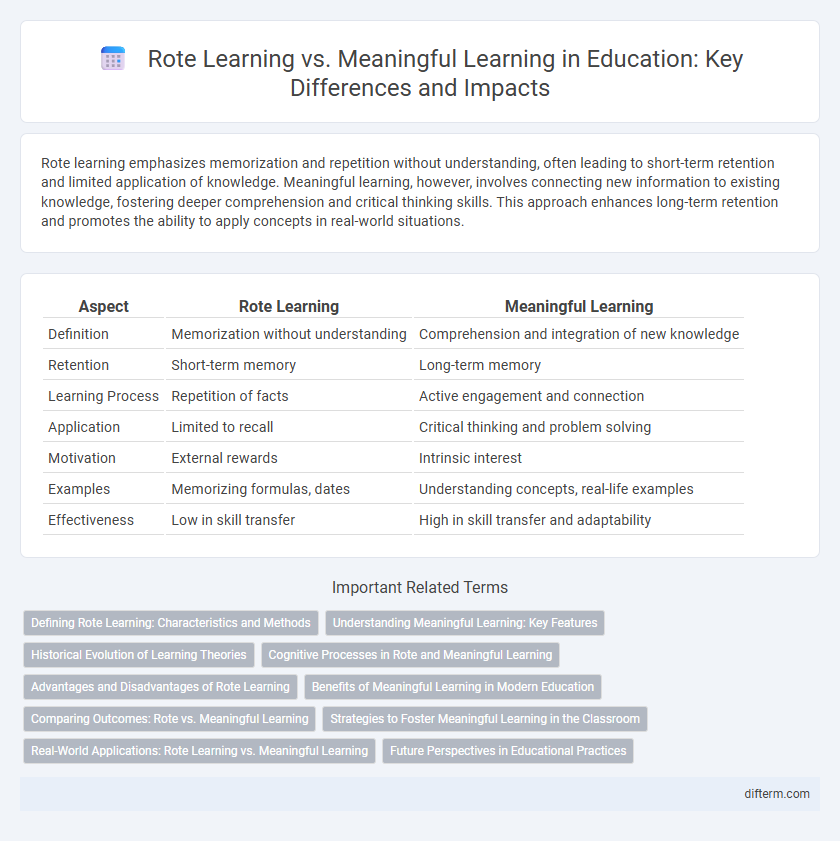Rote learning emphasizes memorization and repetition without understanding, often leading to short-term retention and limited application of knowledge. Meaningful learning, however, involves connecting new information to existing knowledge, fostering deeper comprehension and critical thinking skills. This approach enhances long-term retention and promotes the ability to apply concepts in real-world situations.
Table of Comparison
| Aspect | Rote Learning | Meaningful Learning |
|---|---|---|
| Definition | Memorization without understanding | Comprehension and integration of new knowledge |
| Retention | Short-term memory | Long-term memory |
| Learning Process | Repetition of facts | Active engagement and connection |
| Application | Limited to recall | Critical thinking and problem solving |
| Motivation | External rewards | Intrinsic interest |
| Examples | Memorizing formulas, dates | Understanding concepts, real-life examples |
| Effectiveness | Low in skill transfer | High in skill transfer and adaptability |
Defining Rote Learning: Characteristics and Methods
Rote learning involves memorization through repetition without emphasizing understanding, often characterized by mechanical drills and recitation. Methods include flashcards, repetitive writing, and memorizing facts or formulas verbatim, aiming for quick recall rather than deep comprehension. This approach contrasts with meaningful learning, which focuses on connecting new information to existing knowledge structures for long-term retention and application.
Understanding Meaningful Learning: Key Features
Meaningful learning involves connecting new information to existing knowledge, promoting deep comprehension and long-term retention. It encourages active engagement, critical thinking, and the ability to apply concepts in various contexts. This approach contrasts with rote learning, which relies on memorization without understanding, often leading to superficial knowledge and limited transferability.
Historical Evolution of Learning Theories
Historical evolution of learning theories highlights a shift from rote learning, emphasizing memorization and repetition, to meaningful learning, which prioritizes understanding and application of knowledge. Early behaviorist models, such as Pavlov's classical conditioning and Skinner's operant conditioning, focus on stimulus-response patterns that underpin rote memorization techniques. Cognitive theories introduced by Piaget and Ausubel emphasize the importance of prior knowledge, active engagement, and meaningful connections, transforming educational approaches toward deeper comprehension and critical thinking.
Cognitive Processes in Rote and Meaningful Learning
Rote learning primarily activates memory recall processes, emphasizing repetition and memorization without deep understanding, which limits long-term retention and transferability. Meaningful learning engages higher-order cognitive functions such as critical thinking, comprehension, and the integration of new information with existing knowledge structures, enhancing conceptual understanding. Cognitive neuroscience studies show that meaningful learning stimulates neural pathways involved in semantic processing, facilitating more durable and flexible knowledge acquisition.
Advantages and Disadvantages of Rote Learning
Rote learning enables quick memorization and recall of large volumes of information, making it useful for subjects requiring foundational knowledge like multiplication tables or historical dates. However, it often lacks deep understanding and critical thinking, limiting the ability to apply knowledge in new or complex situations. Overreliance on rote learning can hinder creativity and long-term retention, reducing overall educational effectiveness.
Benefits of Meaningful Learning in Modern Education
Meaningful learning enhances critical thinking by encouraging students to connect new information with existing knowledge, fostering deeper understanding and long-term retention. It promotes active engagement and intrinsic motivation, resulting in improved problem-solving skills and adaptability in real-world scenarios. This approach aligns with modern educational goals, supporting personalized learning paths and the development of 21st-century competencies.
Comparing Outcomes: Rote vs. Meaningful Learning
Rote learning often results in short-term memorization with limited understanding, leading to difficulties in applying knowledge in new situations. Meaningful learning fosters deep comprehension and critical thinking, enabling students to connect concepts and retain information longer. Studies show meaningful learning improves problem-solving skills and academic performance compared to rote memorization methods.
Strategies to Foster Meaningful Learning in the Classroom
Incorporating active learning strategies such as problem-solving tasks, collaborative projects, and real-world applications fosters meaningful learning by encouraging critical thinking and deep comprehension. Utilizing formative assessments and feedback guides students to connect new knowledge with existing cognitive frameworks, enhancing retention and transferability. Creating a classroom environment that values inquiry and reflection helps students engage conceptually rather than relying on rote memorization.
Real-World Applications: Rote Learning vs. Meaningful Learning
Rote learning focuses on memorizing facts without understanding their practical use, limiting students' ability to apply knowledge in real-world situations. Meaningful learning connects new information to existing knowledge, enabling learners to solve problems and adapt concepts to everyday challenges. Emphasizing real-world applications in meaningful learning fosters critical thinking and long-term retention essential for educational success.
Future Perspectives in Educational Practices
Future perspectives in educational practices emphasize a shift from rote learning to meaningful learning, promoting critical thinking, problem-solving, and deep understanding. Integrating technology, personalized learning pathways, and active engagement strategies supports cognitive development beyond memorization. This approach aligns with workforce demands for creativity and adaptability in the knowledge economy.
rote learning vs meaningful learning Infographic

 difterm.com
difterm.com